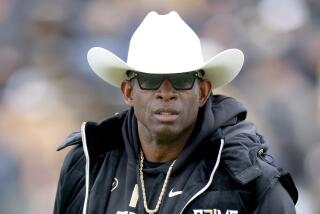Cheers Never Stopped for Grange
- Share via
Red Grange just would not say the words.
“Naw, naw,” he kept telling me. “Aww, naw.”
C’mon Red, say it. We all know it’s true. So just say it.
“Nope, not me,” he said. “Uh-uh.”
So I said it for him: Red Grange made pro football. If it weren’t for what he did more than six decades ago, we would have no choice but to spend our Sundays watching men in pastel sweaters holding thin sticks and hitting dimpled white balls into little holes.
Back in 1925, no Goodyear blimps floated over huge crowds packed into gargantuan football stadiums. Back then, maybe a couple of hundred, or at best a few thousand people, would bundle up and wander out onto a snow-packed baseball field to watch the Frankford Yellowjackets pound on the Cleveland Bulldogs.
It wasn’t just that pro football was struggling in 1925, which it was. Or that you had to get pretty deep into the sports pages even to find a mention of it, which you did. But pro football just didn’t seem . . . American.
College football was king. It was a game of clean-cut young men who tested not only their football skills but their moral fitness. They represented their alma maters and the ideals for which they stood.
To a nation coming off the great moral victory of World War I, when it seemed American values were not capable of being questioned, college ball represented all that was great about this land.
And Red Grange was college ball. He was the son of a lumberjack, earned 16 letters in high school and averaged five touchdowns a game. He entered the University of Illinois in the fall of 1922. He wore No. 77 and amassed a three-year record of 31 touchdowns, 3,636 yards rushing and 643 yards passing.
Against Michigan in 1924, he scored four touchdowns in the first quarter, scored a fifth later and passed for a sixth in front of the then-largest crowd in Midwest football history, 66,609.
On its best day, pro football might have drawn 7,000. The idea of grown men playing football for money was just a little bit repulsive. What were the ideals they fought for? These were just big galoots bashing each other for filthy lucre. And the public was going to be damned if it would pay to see something like that.
“Not me; it wasn’t me,” Red Grange said when I asked him about it. “You write about Halas, George Halas. One of the greatest men ever. He had a vision.”
In 1925, George Halas was not considered one of the greatest men ever. He was considered slightly goofy. Not only did he own and coach the Chicago Bears, but he played right end (on offense and defense), sold tickets and carried press releases to the sportswriters, who usually threw them away.
But Halas did have a vision. And that vision spoke to him in November, 1925. “Get Red Grange,” the vision said.
Only Grange could do it. Only if Halas could sign Grange, already a national hero, could he elevate pro football into something clean and glorious.
And so Grange was approached.
“Oh, it was very simple,” Grange said. “A guy came up to me after a game and said, ‘Kid, how’d you like to make a hundred grand?’ ”
Red Grange though he’d like it fine. And history was made. Grange played his last college game against Ohio State on a Saturday (he gained 235 yards in 48 minutes), signed with Halas on Monday, practiced Tuesday and Wednesday, and opened against the Cardinals in Wrigley Field on Thursday, Thanksgiving Day. He drew 36,000 people, as many as Wrigley Field could hold.
It was said that Halas wept when he counted the receipts that day.
The next day, the team jumped on a train. “We played eight games in 11 days,” Grange said. “We’d flip coins before every game and the losers had to start. We played to 85,000 in L.A. Some 70,000 broke down the fences at the Polo Grounds, and, hell, some of those figures set records for years.”
I met him 49 years later. His hair had retained only the barest tint of auburn amid the gray. He had come back to Illinois to celebrate the anniversary of his famous victory against Michigan.
There were parties, receptions and honors. But Grange remained Grange. After hearing yet another speech about how glorious he was during that Michigan game, Grange leaned over to me and whispered: “I got to tell you something about Michigan. Your grandmother could have scored on them that day.”
There was only one event that had troubled him. Illinois was once again playing Michigan, and on the Friday before the game the team had assembled in the seats of an empty, rain-swept stadium to hear from Grange.
They sat there, huge-looking in their uniforms, helmets at their feet, watching Grange being helped up the steep concrete steps.
He didn’t know what to say to them. He did not want to be laughed at. He was nervous. He kept touching his cheek and glancing down as he spoke.
But he told them about his days in football and what the game had meant to him. And he concluded simply.
“Block hard,” he said.
“Tackle hard,” he said.
“And thanks,” he said. “Thanks for listening to me.”
There was an awful pause. And then the kids stood up and cheered and cheered.
He looked at them for a moment and then turned away before they could see the tears in his eyes.
Red Grange died last week. But I bet he heard those cheers right up until the end.
More to Read
Go beyond the scoreboard
Get the latest on L.A.'s teams in the daily Sports Report newsletter.
You may occasionally receive promotional content from the Los Angeles Times.









